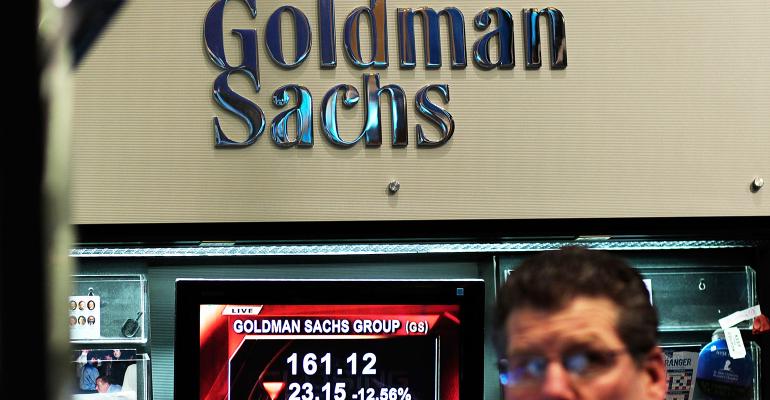By Dakin Campbell and Jenny Surane
(Bloomberg) --Goldman Sachs Group Inc. is again turning to technology to establish a foothold in a new market.
The Wall Street firm is targeting independent investment advisers -- those unaffiliated with big brokerages like Morgan Stanley or Bank of America Corp. -- with a new lending platform. A venture announced Thursday with a unit of Fidelity Investments will allow the advisers to offer clients loans of as much as $25 million backed by their investment portfolios. And it will mean Goldman Sachs can squeeze more money from its growing deposit base.
“Lending is an important part” of the adviser-client relationship, said Andrew Kaiser, Goldman Sachs’s global head of private banking. Independent advisers “can’t do it themselves because they aren’t banks. They don’t want to be banks. But we can be their virtual bank.”
The effort is the latest from Goldman Sachs to take advantage of a banking license it acquired during the financial crisis and a 151 percent increase in deposits over the past five years. The Wall Street firm has searched for ways to build the franchise and spread the cost of running it over a broader revenue base. It now pays some of the highest U.S. savings rates through a deposit-taking unit bought from General Electric Co., has begun offering consumer loans through its online Marcus operation, and does more financing for corporations and other institutional clients.
Quick Turnaround
It’s also the latest sign that Chief Executive Officer Lloyd Blankfein is looking for ways to expand the private wealth business, a unit that has historically eschewed the type of customers typically served by mass-market retail brokerages in favor of private banking’s ultra-wealthy clientele. The firm is also considering the development of an automated investing service.
Goldman Sachs’s technology will reduce the wait for getting a securities-based loan to as little as a day from as much as several weeks, according to the statement. A small team of Goldman Sachs bankers -- doubling to 20 people by year-end -- will provide advice to financial advisers, who will continue to deal directly with clients and help them select what loan best fits their needs. Their size will range from $75,000 to $25 million.
Goldman is moving into a business already being mined by other lenders, including U.S. Bancorp, which also has struck a deal with Fidelity Institutional, a unit of Fidelity Investments that provides services for registered investment advisers, broker-dealers and family offices. After it debuted a similar product with Fidelity last year, the Minneapolis-based bank moved into more niche products -- such as financing aircraft and life insurance premiums -- with the same customers, said Rachel Ferguson, U.S. Bancorp’s national private banking director.
‘Deeper Lending’
Advisers are “asking for access to more and deeper lending capabilities,” said Mike Durbin, head of Fidelity Institutional Product. “You need to work on both the liability and the asset side of a personal household balance sheet.”
The product may level the playing field for advisers who compete with the largest brokerages, which are owned by banks and have made lending to wealthy clients a priority. In some cases, advisers can lose customers or assets if they aren’t able to offer loans, Kaiser said.
Securities-based loans, which are among the more lucrative products available through brokerage channels, are likely to be followed by other offerings to independent advisers and small broker dealers, Kaiser said. Future products would need to be easily distributed through similar technology, he said.
“We’re building a marketplace for RIAs and other financial advisers to help manage liquidity and liabilities for their clients,” Kaiser said. “To the extent, down the road, that we will add more products, they will be scalable.”
To contact the reporters on this story: Dakin Campbell in New York at [email protected] ;Jenny Surane in New York at [email protected] To contact the editors responsible for this story: Michael J. Moore at [email protected] Steven Crabill, David Scheer





